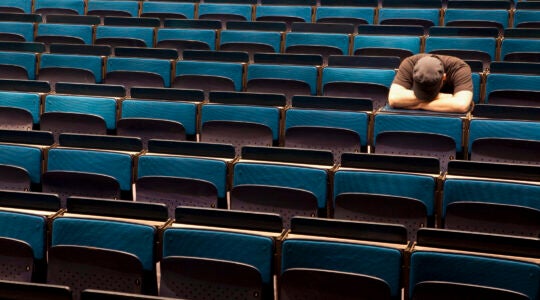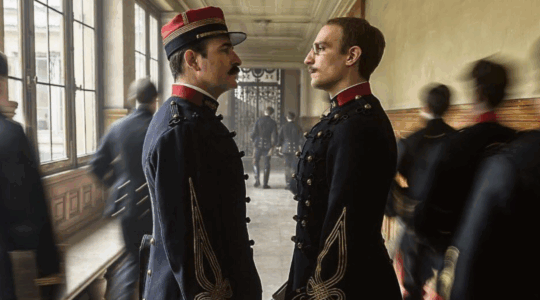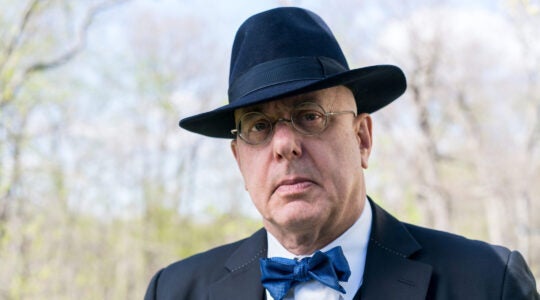We recently conducted a survey of Conservative rabbis about intermarriage and were fascinated by what we learned.
For a while now, we’ve known anecdotally of Conservative rabbis seeking to modify their approach to interfaith families. Some have mused about it publicly. Rabbi Charles Simon of the Federation of Jewish Men’s Clubs has been an important voice for greater inclusion within the movement, and indeed the door has opened a crack over the past decade toward allowing increased participation in Conservative synagogues by intermarried families.
The Conservative movement is certainly capable of more than just incremental change when addressing important issues affecting many Jewish households, as it has already demonstrated by its acceptance of gay and lesbian rabbinic students, and allowing its rabbis to officiate at gay and lesbian weddings.
When it comes to interfaith marriage, however, it would appear from the lack of policy change that there is strong support among Conservative rabbis for the movement’s current stance. The movement does not allow Conservative rabbis to officiate at weddings between Jews and non-Jews. It also bans rabbis attending intermarriages as guests, even if it’s the wedding of their own children.
We decided to go to the rabbis directly to ask if there really is consensus, and we found that there is not, and that a significant percent want further discussion about these issues.
Some say that we had an “agenda” in conducting the survey (available online here and we did, to open a discussion among the rabbis affected by these policies. It worked. Many rabbis told us they appreciated the findings. The pushback we’ve received, interestingly, has not been about the issues themselves but about the study’s methodology.
Questioning research methodology is wonderful and I hope it is something that becomes a regular feature of all reporting of all Jewish studies. Because everyone has an agenda. All the studies of Jews are conducted by other Jews, most of whom are much more connected to the Jewish community than the Jews they’re studying. Public self-reflection about how that might bias their work and what their connections are to the issues (emotionally, financially) would add a welcome degree of transparency.
Our survey included nearly 250 Conservative rabbis, about 15 percent of the estimated total, but it was indeed an opt-in survey – as explained in the methodology section of the study – and the percentages are therefore debatable, as they are in all surveys.
So I won’t use the percentages, and simply report that we found 77 Conservative rabbis who said yes when asked this question: If the movement’s policy changed, could you see yourself officiating under any circumstances at a marriage between a Jew and a non-Jew.
If you believe that our survey found the entire universe of Conservative rabbis who would consider officiating at intermarriages – making it the most self-selecting study of all time (an accomplishment in and of itself!) – well, that’s still 77 rabbis.
Obviously, because it was 77 out of about 250, we feel it actually represents the position of many hundreds of Conservative rabbis. But either way, to the 77 (or more) Conservative rabbis who would consider it, we say: That’s a significant number; find your likeminded peers and initiate some conversations.
Since the study’s release, we’ve already heard from several Conservative rabbis who pointed to the precedent set by the new liturgical rituals created for gay and lesbian weddings as a blueprint for creating a Conservative interfaith wedding ceremony. That seems like one potential starting point for a conversation. Most will still be against officiating at interfaith weddings, but again, the goal of this study was not to push rabbis to do it but to foster a conversation about those who would.
Our study also found 97 Conservative rabbis who’ve defied the ban on attending interfaith marriages (including 8 who’ve already officiated at intermarriage). That it was 97 rabbis out of the 197 who answered that question suggests to us that the ban is widely flouted, but again, we encourage those who disagree with the methodology to conduct their own survey!
Regardless of the exact percentage, isn’t it fair to raise questions about the message behind that ban, when today there are more intermarried than in-married households in America? At least 62 Conservative rabbis out of the 215 who answered this question have intermarriage in their own immediate family, either their children or siblings or parents. Where is the assessment of the effectiveness of this policy?
As part of an organization that helps other Jewish organizations “open their tent” – to interfaith families as well as all others who’ve been previously marginalized or simply don’t think there’s anything relevant for them in Jewish communal life – my colleagues and I have consulted with over 500 Jewish organizations, including dozens of Conservative synagogues, over the past decade.
I’ve personally met with many wonderful individuals among the volunteer and professional leadership of Conservative synagogues. Universally, they want to find ways to welcome and serve more people, and in most cases that includes intermarried households. For many of these leaders, there is a sense that their hands are tied, but for different reasons. Some point to Jewish law and tradition, others point only to movement policy. In both cases, as we drill deeper on the issues with them, it’s clear that these are not conversations that are happening regularly, if at all, despite being among the most important issues affecting their community (and livelihood).
It’s easier to dicker over numbers than it is to address difficult issues. We’ve been encouraged by those who see our study as a starting point for deeper conversations, and we look forward to where that might take us as a community.
Paul Golin is associate executive director of Big Tent Judaism.
The New York Jewish Week brings you the stories behind the headlines, keeping you connected to Jewish life in New York. Help sustain the reporting you trust by donating today.




